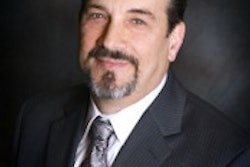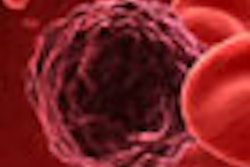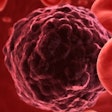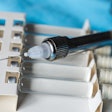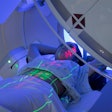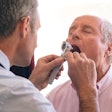
Who is better positioned to detect oral cancer -- dentists or physicians? While both have their strengths, they are also missing opportunities for improved screening and early detection, according to a new study in the Journal of the American Dental Association.
Physicians are better at educating patients about the risk factors of oral cancer, but they are not comfortable with the exam, according to the study authors. And while dentists are comfortable with the exam, they do not spend enough time talking with their patients about risk factors or on other education activities, the researchers found.
A gap in knowledge and practices among physicians and dentists needs to be filled with enhanced oral cancer education for both professional groups, the authors noted.
Although the study was conducted in Massachusetts, there are indications this could be a national trend.
"Investigators reported similar results from surveys of dentists and physicians in Illinois and Maryland, suggesting that knowledge deficits and practice issues exist in other regions of the country, and our findings can, in large part, be extrapolated nationally," the authors noted (JADA, April 2009, Vol. 140:4, pp. 461-467).
The researchers studied the answers from a 38-item questionnaire filled out by 118 physicians and 274 dentists. The sample population included all general medicine, internal medicine, and family practice physicians listed with the Massachusetts Board of Registration in Medicine and all Massachusetts Dental Society members.
Survey questions included the clinicians' demographic characteristics; clinicians' practices with regard to performing oral cancer exams in patients and their assessment of patients' risk factors; their knowledge about the signs, symptoms, and characteristics of oral cancer lesions; and their opinions of their knowledge level and training regarding the oral cancer exam.
Among the survey's findings:
49% of physicians said they performed an oral cancer exam in patients between the ages of 40 and 55, compared to 92% in dentists. For patients 56 years or older, 54% of physicians reported performing oral cancer exams, compared to 93% of dentists.
85% of physicians believed that they were trained to provide their patients with tobacco-use cessation education, compared to only 24% of dentists. And 75% of physicians believed they were trained to provide alcohol-use cessation education, compared to only 12% of dentists.
Only 9% of physicians and 39% of dentists were able to identify the two most common sites on which oral cancer develops.
Only 34% of dentists and 10% of physicians could identify erythroplakia and leukoplakia as the two conditions most likely to be associated with oral cancer.
85% of dentists agreed or strongly agreed that they were adequately trained to examine patients for oral cancer, compared to 46% of physicians.
Approximately 50% of dentists but only 5% of physicians agreed or strongly agreed that their knowledge about oral cancer was current.
The study findings emphasize that physicians and dentists need to be involved in both oral cancer prevention and detection, said Edward Peters, D.M.D., Sc.D., one of the study authors, in an interview with DrBicuspid.com. Both physicians and dentists have unique advantages when it comes to screening for oral cancer.
"Dentists see patients perhaps twice a year so [they] have a greater opportunity, and they can also involve hygienists," said Dr. Peters, who is an assistant professor of epidemiology at the Louisiana State University Health Sciences Center School of Public Health. "However, most oral cancer patients with heavy tobacco and alcohol use tend to have comorbidities and may be under the care of a physician, and might not be seeing a dentist for lack of insurance, etc. So they both have a role and should be partners."
Lack of reimbursement and awareness are two major factors inhibiting efficient oral cancer screening, he added.
A billable code and a screening test that would improve the exam activity could have a positive impact on oral cancer screening practices within the dental profession, Dr. Peters said.
"However, in contrast to primary care physicians, dentists do not bill or get reimbursed for evaluation and management procedures," he noted. "Physicians can bill for preventive services such as counseling based on the time they spend talking with the patient."
While regular oral cancer screenings during routine dental visits might not necessarily benefit the practice, it would benefit the patients and that is really what it is all about, Dr. Peters concluded.
"Further investigation may be required to fully understand the barriers to consistent oral cancer screening and detection practices in Massachusetts and across the United States," the study authors concluded. "In the meantime, the inclusion of risk factor screening, physical examinations of the oral cavity, and behavior modification intervention training in dental and medical school curricula, as well as access to continuing education programs on these subjects, would begin to address the deficiencies we observed."
Copyright © 2009 DrBicuspid.com




